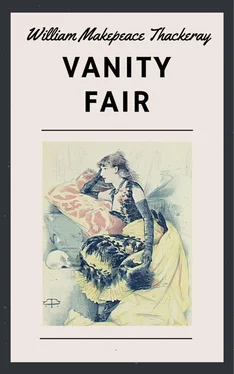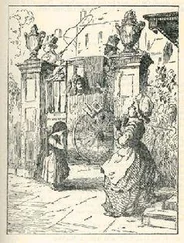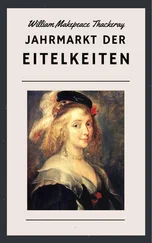At four o'clock, on such a roseate summer's morning as even made Great Gaunt Street look cheerful, the faithful Tinker, having wakened her bedfellow, and bid her prepare for departure, unbarred and unbolted the great hall door (the clanging and clapping whereof startled the sleeping echoes in the street), and taking her way into Oxford Street, summoned a coach from a stand there. It is needless to particularize the number of the vehicle, or to state that the driver was stationed thus early in the neighbourhood of Swallow Street, in hopes that some young buck, reeling homeward from the tavern, might need the aid of his vehicle, and pay him with the generosity of intoxication.
It is likewise needless to say that the driver, if he had any such hopes as those above stated, was grossly disappointed; and that the worthy Baronet whom he drove to the City did not give him one single penny more than his fare. It was in vain that Jehu appealed and stormed; that he flung down Miss Sharp's bandboxes in the gutter at the 'Necks, and swore he would take the law of his fare.
"You'd better not," said one of the ostlers; "it's Sir Pitt Crawley."
"So it is, Joe," cried the Baronet, approvingly; "and I'd like to see the man can do me."
"So should oi," said Joe, grinning sulkily, and mounting the Baronet's baggage on the roof of the coach.
"Keep the box for me, Leader," exclaims the Member of Parliament to the coachman; who replied, "Yes, Sir Pitt," with a touch of his hat, and rage in his soul (for he had promised the box to a young gentleman from Cambridge, who would have given a crown to a certainty), and Miss Sharp was accommodated with a back seat inside the carriage, which might be said to be carrying her into the wide world.
How the young man from Cambridge sulkily put his five great-coats in front; but was reconciled when little Miss Sharp was made to quit the carriage, and mount up beside him—when he covered her up in one of his Benjamins, and became perfectly good-humoured—how the asthmatic gentleman, the prim lady, who declared upon her sacred honour she had never travelled in a public carriage before (there is always such a lady in a coach—Alas! was; for the coaches, where are they?), and the fat widow with the brandy-bottle, took their places inside—how the porter asked them all for money, and got sixpence from the gentleman and five greasy halfpence from the fat widow—and how the carriage at length drove away—now threading the dark lanes of Aldersgate, anon clattering by the Blue Cupola of St. Paul's, jingling rapidly by the strangers' entry of Fleet-Market, which, with Exeter 'Change, has now departed to the world of shadows—how they passed the White Bear in Piccadilly, and saw the dew rising up from the market-gardens of Knightsbridge—how Turnhamgreen, Brentwood, Bagshot, were passed—need not be told here. But the writer of these pages, who has pursued in former days, and in the same bright weather, the same remarkable journey, cannot but think of it with a sweet and tender regret. Where is the road now, and its merry incidents of life? Is there no Chelsea or Greenwich for the old honest pimple-nosed coachmen? I wonder where are they, those good fellows? Is old Weller alive or dead? and the waiters, yea, and the inns at which they waited, and the cold rounds of beef inside, and the stunted ostler, with his blue nose and clinking pail, where is he, and where is his generation? To those great geniuses now in petticoats, who shall write novels for the beloved reader's children, these men and things will be as much legend and history as Nineveh, or Coeur de Lion, or Jack Sheppard. For them stage-coaches will have become romances—a team of four bays as fabulous as Bucephalus or Black Bess. Ah, how their coats shone, as the stable-men pulled their clothes off, and away they went—ah, how their tails shook, as with smoking sides at the stage's end they demurely walked away into the inn-yard. Alas! we shall never hear the horn sing at midnight, or see the pike-gates fly open any more. Whither, however, is the light four-inside Trafalgar coach carrying us? Let us be set down at Queen's Crawley without further divagation, and see how Miss Rebecca Sharp speeds there.
CHAPTER VIII: Private and Confidential
Miss Rebecca Sharp to Miss Amelia Sedley, Russell Square, London. (Free.—Pitt Crawley.)
MY DEAREST, SWEETEST AMELIA,
With what mingled joy and sorrow do I take up the pen to write to my dearest friend! Oh, what a change between to-day and yesterday! Now I am friendless and alone; yesterday I was at home, in the sweet company of a sister, whom I shall ever, ever cherish!
I will not tell you in what tears and sadness I passed the fatal night in which I separated from you. YOU went on Tuesday to joy and happiness, with your mother and YOUR DEVOTED YOUNG SOLDIER by your side; and I thought of you all night, dancing at the Perkins's, the prettiest, I am sure, of all the young ladies at the Ball. I was brought by the groom in the old carriage to Sir Pitt Crawley's town house, where, after John the groom had behaved most rudely and insolently to me (alas! 'twas safe to insult poverty and misfortune!), I was given over to Sir P.'s care, and made to pass the night in an old gloomy bed, and by the side of a horrid gloomy old charwoman, who keeps the house. I did not sleep one single wink the whole night.
Sir Pitt is not what we silly girls, when we used to read Cecilia at Chiswick, imagined a baronet must have been. Anything, indeed, less like Lord Orville cannot be imagined. Fancy an old, stumpy, short, vulgar, and very dirty man, in old clothes and shabby old gaiters, who smokes a horrid pipe, and cooks his own horrid supper in a saucepan. He speaks with a country accent, and swore a great deal at the old charwoman, at the hackney coachman who drove us to the inn where the coach went from, and on which I made the journey OUTSIDE FOR THE GREATER PART OF THE WAY.
I was awakened at daybreak by the charwoman, and having arrived at the inn, was at first placed inside the coach. But, when we got to a place called Leakington, where the rain began to fall very heavily—will you believe it?—I was forced to come outside; for Sir Pitt is a proprietor of the coach, and as a passenger came at Mudbury, who wanted an inside place, I was obliged to go outside in the rain, where, however, a young gentleman from Cambridge College sheltered me very kindly in one of his several great coats.
This gentleman and the guard seemed to know Sir Pitt very well, and laughed at him a great deal. They both agreed in calling him an old screw; which means a very stingy, avaricious person. He never gives any money to anybody, they said (and this meanness I hate); and the young gentleman made me remark that we drove very slow for the last two stages on the road, because Sir Pitt was on the box, and because he is proprietor of the horses for this part of the journey. "But won't I flog 'em on to Squashmore, when I take the ribbons?" said the young Cantab. "And sarve 'em right, Master Jack," said the guard. When I comprehended the meaning of this phrase, and that Master Jack intended to drive the rest of the way, and revenge himself on Sir Pitt's horses, of course I laughed too.
A carriage and four splendid horses, covered with armorial bearings, however, awaited us at Mudbury, four miles from Queen's Crawley, and we made our entrance to the baronet's park in state. There is a fine avenue of a mile long leading to the house, and the woman at the lodge-gate (over the pillars of which are a serpent and a dove, the supporters of the Crawley arms), made us a number of curtsies as she flung open the old iron carved doors, which are something like those at odious Chiswick.
"There's an avenue," said Sir Pitt, "a mile long. There's six thousand pound of timber in them there trees. Do you call that nothing?" He pronounced avenue—EVENUE, and nothing—NOTHINK, so droll; and he had a Mr. Hodson, his hind from Mudbury, into the carriage with him, and they talked about distraining, and selling up, and draining and subsoiling, and a great deal about tenants and farming—much more than I could understand. Sam Miles had been caught poaching, and Peter Bailey had gone to the workhouse at last. "Serve him right," said Sir Pitt; "him and his family has been cheating me on that farm these hundred and fifty years." Some old tenant, I suppose, who could not pay his rent. Sir Pitt might have said "he and his family," to be sure; but rich baronets do not need to be careful about grammar, as poor governesses must be.
Читать дальше












